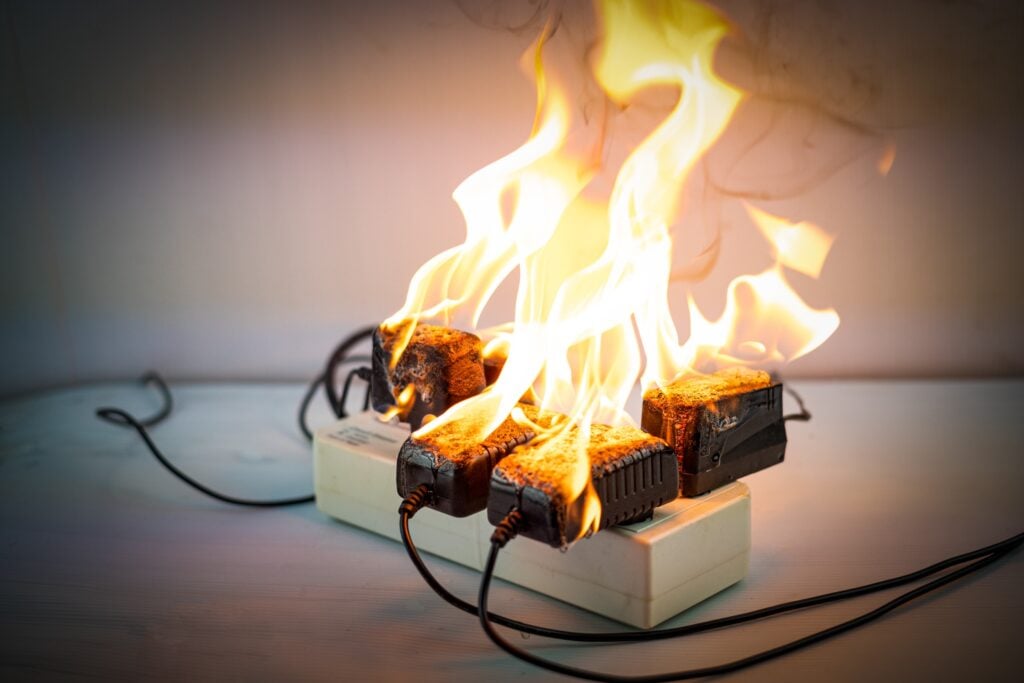
Burn Awareness Week takes place every year during the first full week of February. Safety organizations across the country share information and spread awareness on how to prevent getting burned. The Las Vegas injury lawyers at ER Injury Attorneys would like to contribute to the event by sharing safety tips on how to prevent one of the most overlooked types of burn injuries: electrical burns.
Below are important safety tips to help you and your family avoid electrical burns and related electrocution injuries. Please share them with your friends and family as part of Burn Awareness Week.
What Are Electrical Burns?
Before we share our safety tips, it’s important to understand this particular type of burn injury. Electrical burns are injuries caused by electrical current passing through the body, leading to tissue damage. They can occur from direct contact with live wires, electrical appliances, lightning strikes, and more. These burns can be deceptive, since the injury isn’t always immediately visible, but can often result in deep tissue damage beneath the skin’s surface. Symptoms of electrical burns can include skin damage, tingling, muscle contractions, and cardiac arrest. Immediate medical attention is crucial due to the potential for internal catastrophic injuries.
Essential Tips for Preventing Electrical Burns
Electricity is an essential part of our everyday lives. It powers everything from our light bulbs to our favorite personal electronics to kitchen appliances we use daily. However, since people can’t see electricity, its power is often underestimated, which can lead to electrical burns. These electrocution injuries can range from minor shocks to severe tissue damage, leaving lasting physical and emotional scars.
Fortunately, most electrical burns are preventable with a healthy dose of awareness and proactive measures. As part of Burn Awareness Week, here are four ways to help your household avoid electrical burns.
Keep an Eye on Your Appliances and Electronics
- Inspect Regularly: regularly inspect cords, plugs, surge protectors, and appliances for signs of damage like fraying, cracks, or loose connections. Discard any damaged or faulty equipment immediately.
- Keep Electronic Devices Away from Water: water and electricity form a dangerous duo. Keep appliances and electronic devices away from sinks, bathtubs, toilets, and standing water. When using electronics near water sources, opt for Ground Fault Circuit Interrupter (GFCI) outlets, which automatically shut off power in case of a leak.
- Do Not Overload Outlets: avoid overloading outlets and power strips. Each has a maximum capacity, and exceeding it can cause electrical burns, overheating, and other potential fire hazards.
Keep Your Hands Dry and Unplug for Safety
- Keep it Dry: never handle electrical equipment with wet hands, as moisture conducts electricity. Ensure that your work area is dry and free of spills before performing any electrical tasks.
- Unplug for Safety: when an appliance isn’t in use, unplug it. This reduces the risk of accidental shocks and potential fire hazards, especially for appliances susceptible to overheating.
- Know Your Limits: if you perform many home improvement tasks on your own then you know that DIY electrical work carries significant risks. While basic tasks are fine for most people, our Las Vegas injury attorneys suggest leaving complex repairs and installations to qualified electricians.
Childproof Your House to Protect Kids from Electrical Burns
- Install Outlet Protectors: curious young minds often explore with their hands. Invest in outlet covers to prevent children from inserting objects into outlets.
- Lock Down Your Appliances: secure small kitchen appliances, such as toasters and coffee makers, so that children can’t play with them easily. If your kids are particularly curious then consider using appliance locks or cable organizers to further hinder accessibility.
- Teach Your Children Well: discuss electrical safety with your children. Explain the dangers and teach them responsible behavior around electrical equipment. Knowledge can be a powerful thing, especially for little ones.
Preventing Outdoor Shocks and Electrical Burns
- Avoid Downed Power Lines: never approach downed power lines, even if they appear inactive. Treat them as if they were live, while maintaining a safe distance. Contact your local utility company immediately to report the potential danger.
- Be Cautious With Extension Cords: use outdoor extension cords sparingly and only for temporary purposes. Choose cords with an adequate gauge for outdoor use and never overload them. Inspect them regularly for damage and wear.
- Stay Inside if There’s Lightning: during thunderstorms, seek shelter indoors and avoid using electrical appliances. Close windows and doors to minimize the risk of lightning strikes entering the home.
By incorporating these Burn Awareness Week safety tips into your daily routine, you can significantly reduce the risk of electrical burns. Remember, a little caution can prevent a lifetime of pain and potential scarring. Stay informed, stay vigilant, and keep your home safe for your family and guests.
Please Share Our Burn Awareness Week Tips
ER Injury Attorneys hopes that you have a better understanding of the ways that you can prevent electrical burns. Please share this guide with your family and friends as part of Burn Awareness week this February. Should you receive an electrical burn or other electrocution injury due to the actions or inactions of another party then contact us for immediate assistance.
You can reach ER Injury Attorneys’ team of accomplished Nevada lawyers 24 hours a day, 7 days a week. We are available by phone at 702-878-7878 and online through LiveChat or secure contact form. Our firm represents injury victims throughout Southern Nevada, including Henderson, Summerlin, Pahrump, Boulder City, Laughlin, and beyond. Take the first step towards the settlement that you deserve and reach out to us today.
